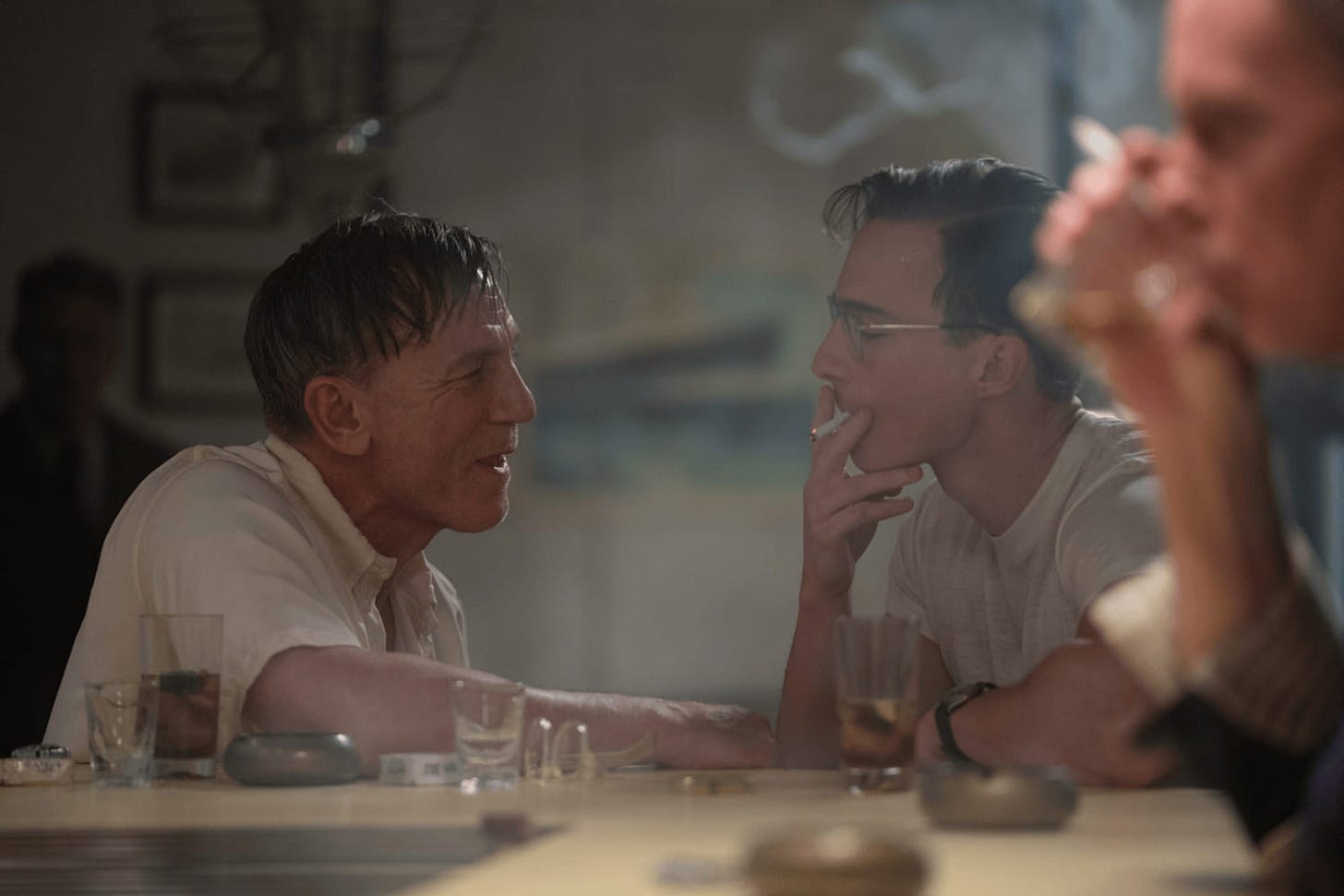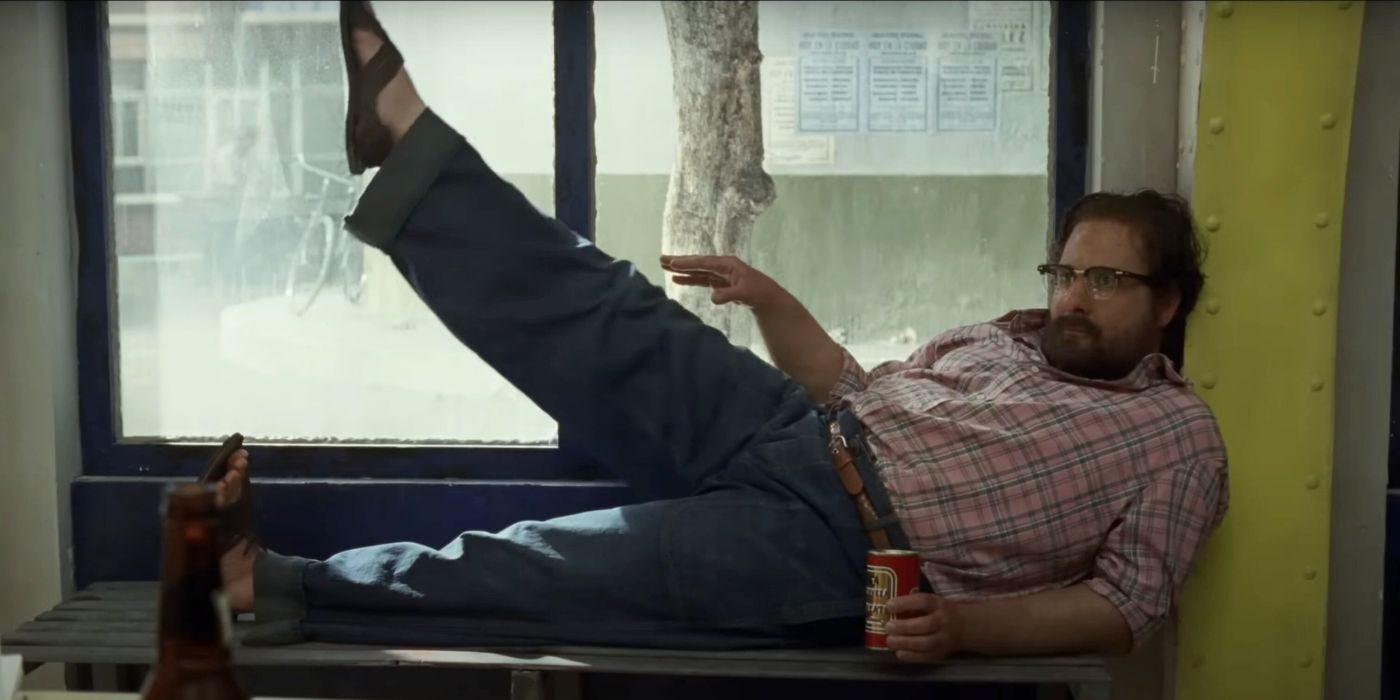StubStack: Queer
Set in 1950s Mexico City, Queer follows Lee (Daniel Craig), a gay American expatriate, as he desperately searches for intimacy.
Adapted from William S. Burroughs' novel of the same name, Queer captures the loneliness, isolation, and desperate yearning for affection and community felt by the socially outcast.
A Character Study
Queer is driven more by character than plot, focusing on Lee’s emotional journey and how his feelings shape his actions and affect those around him. As Lee spends his time drinking excessively and pursuing younger men, we see that these behaviors are a desperate attempt to cope with his feelings of insecurity and isolation. Daniel Craig draws the audience in with Lee’s lighthearted and charming disposition, while his underlying desperation subtly seeps through, revealing the sorrow behind his forced smile. This raw emotional display, partially hidden behind a mask, poignantly highlights the social and emotional toll of ostracization. Without Craig’s remarkably vulnerable performance at its core, Queer would undoubtedly be a much lesser film.
Craig’s performance is not the only standout. Drew Starkey, of Outer Banks fame, delivers a scorching hot performance as Eugene Allerton, a young GI and fellow American expatriate. Lee is immediately drawn to Allerton, captivated by his striking beauty. It doesn’t take long before Lee becomes completely enamored, dedicating himself to winning Allerton's affection in hopes of finding the connection he’s so desperately searching for.
Their relationship becomes tumultuous—like a roller coaster, shifting from intense passion to cold detachment and back again in the blink of an eye. Starkey’s Allerton plays a crucial role in the film, illustrating the often transactional nature of intimate relationships and the compromises people make in pursuit of perceived benefits.
Daniel Craig as Lee & Drew Starkey as Allerton
Frankly, while I don’t want to downplay Starkey’s acting talent—of which he has plenty—his most important contribution to the film is undoubtedly his sheer physical allure. Luca Guadagnino, the director of Queer and a gay man himself, clearly knew how to physically showcase Starkey, making him one of the sexiest men on the big screen in 2024. It’s reminiscent of Jude Law’s unforgettable beauty in The Talented Mr. Ripley. Truly gorgeous. Now, I’m not a gay man, but I know beauty when I see it, and I’m comfortable enough with my sexuality to admit that Drew Starkey in Queer is smokin’ hot.
But I digress…
Some Levity
Jason Schwartzman as Joe, Lee’s friend
I can’t go without mentioning Jason Schwartzman’s performance—every time he appears on screen in Queer, it's a delight. He plays a burly, hairy, Birkenstock-wearing gay man who had the entire theater giggling on multiple occasions. In fact, he got a laugh every time he appeared. Schwartzman is always strong, especially in supporting roles, but this performance is one of his finest. He brings a much-needed levity and humor to Queer that would be noticeably absent without him. It’s such a warm, fun, and wonderfully goofy performance—just thinking back on it brings a smile to my face.
Queer's performances aren't its only strengths—it also looks stunning. The set and production design, along with the costumes, are meticulously crafted, immersing the audience in the world of 1950s Mexico City. The music, composed by Trent Reznor and Atticus Ross of Nine Inch Nails, is eerie and introspective, playing a key role in setting the tone and shaping the film's atmosphere.
There’s a trippy quality to the filmmaking, enhanced in some scenes by drug use, to be aware of going into the film. It didn’t always resonate with me, however, it never pulled me out of the film or became a distraction.
While Queer may not be the most exciting film from moment to moment, it is quite thought-provoking, leaving the audience with plenty to consider.





